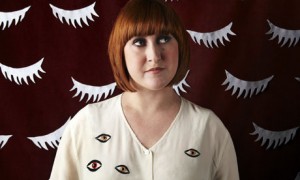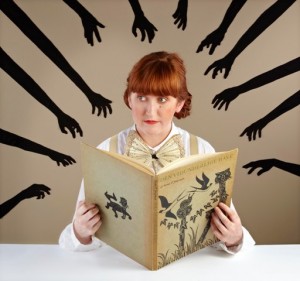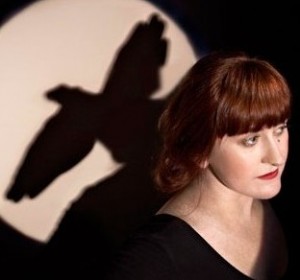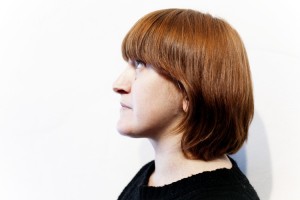Do you think the place where you grew up is any way responsible for the kind of music you play now?
Yes. That’s a good question. I grew up on the Wirral, which is a really small place in Britain surrounded on three sides by water.
I know the place because I spent some time there.
Oh, really?
In West Kirby.
Oh, why did you go there?
Actually I worked for about a year as an assistant teacher for German in West Kirby.
West Kirby Grammar School?
West Kirby Grammar School for Girls and Calday Grange on top of the hill.
Oh, that’s the school I went to. West Kirby…
When was that?
1994 to 2000.
That’s funny.
Were you there?
 Well, I started working there in the autumn of 1994 and stayed until summer 1995.
Well, I started working there in the autumn of 1994 and stayed until summer 1995.
Oh wow. I was in first year of secondary school. Oh how cute (laughs). West Kirby is a funny place. And it’s quite special as well. The scenery is as a teenager pretty boring, you know, pretty dull.
I can imagine.
But Liverpool is really near. So you know I had these two bits of life. Where I’d be stuck at home on the Wirral. There’s not much. So I read a lot and I created a lot. I sat in my room a lot…thinking (laughs). And then I had this other bit of life where I started going into Liverpool, going out to rock clubs when I was about 14, 15 and having a kind of loud crazy life. Yeah, it definitely influenced the music.
When people talk about your music – and I remember you posting something from the Guardian on your website – they all seem to stress this vintage element. Are you happy with the tag?
Well, I mean, it does sound like that. You know the orchestration and my voice. And also they find it hard to pinpoint that. And to me it doesn’t sound like that and I’m not trying to sound like that. It’s just what comes out. I wasn’t in bands when I was growing up. I didn’t sing when I was growing up and I didn’t play the guitar when I was growing up. You know I digested a lot of music and a lot of books and a lot of information in other ways and one day it just came out and that’s what came out. I think it’s a kind of melting pot of all the things that have influenced me.
On our website there’s a review of your album and the authors that came to the reviewer’s mind when listening to your music were those that are sometimes associated with so-called Southern Gothic, Flannery O’ Connor and William Faulkner. Are they authors who interest you?
Well, I mean I like stories and I’m interested in Southern Gothic actually and there’s a story by Richard Brautigan. What’s it called? The gothic one. I like his writing. You know, I like the kind of ghostliness. I’m kind of fascinated by places that aren’t where you are. Everyone is, aren’t they? Because they’ve got this element of exoticism and you know America just seems to be this vast desert full of freak shows and Coney Island and Tom Waits is singing around the corner and Blues people walking down roads to me. So America is such a new country but all the myths that it’s created around it…That’s pretty impressive for something that’s just a couple of hundred years old.
Are there any English writers that you really like?
I like books. I read a lot. I can’t remember. Who is English?
Never mind.
I like all books. I can’t remember. I’ve read so much. But I do like foreign fiction. I like Hermann Hesse a lot, Dostojevski, they’re quite philosophical but Dostojevski in particular is quite funny. Oh, George Orwell. He’s amazing.
Today I spoke with a group of students about “1984″.
Wow. “1984″ is incredible. One of my favourite George Orwell ones is “Coming up for air”, which is about a middle-aged man living in a village with his wife and his kids and kind of lamenting his lost youth.
When I was about 16 I read a couple of Orwell books: “1984“, “Road to Wigan Pier“, “Down and out in Paris and London”. I remember that the end of 1984, when he finally loves Big Brother, I was petrified. There was no way out of it.
Yeah, there are similar themes in “Coming up for air”. I went to university to do an English degree. I love books so that was what I thought I should do but it turned out that I just liked reading books and researching but I wasn’t very good at writing the essays. I didn’t want to give it back in a kind of prescribed way. It came out in a different way. But while I was there I was really interested in the notion of the outsider in society. Everyone sometimes feels that there’s nobody else quite like them or that they’re invisible. So “Notes from the Underground” by Dostojevski and Ralph Ellison’s “Invisible Man“. This man sits in the basement beneath the towerblock and he siphons off the electricity. He has thousands of lightbulbs covering his room and I liked this idea of this quiet defiance.
 You’ve talked about the outsider and you being interested in that. You released two singles. Was that a kind of statement against downloading?
You’ve talked about the outsider and you being interested in that. You released two singles. Was that a kind of statement against downloading?
Actually we wanted to release a gramophone record but couldn’t find anybody to do it cheap enough. (laughs). That was the first thing we released. He is now my manager but back then we were just friends and we thought just for a laugh to put something out. A gramaphone record would have been good. It’s almost as if we didn’t want anyone to listen to it. Actually I think that 7′-singles are actually quite a nice format now. Music has become almost cheapened, well not cheapened but it has become so easily accessible now. CDs are kind of obsolete. If you give someone a 7′ or a record it has actually some kind of tactile value. You know it’s coming back. People are buying the vinyl record rather than the CDs. It’s nice to make things.
It’s nice to have them. If everything is accessible immediately it kind of loses its worth.
That’s the same with lot of society. We don’t need to save. We’ve got a credit card and nobody saves their money. The idea of doing limited runs of things that are special is great.
I mean somebody like Stephen [Burch, The Great Park, Woodland Recordings] does a great job.
Well, I used to be on a label called Humble Soul. We were doing exactly the same thing, my friend runs a label called Red Deer Club, they’re doing exactly the same thing. Everything we make is small runs of handmade loveliness. Yeah, it’s really important keeping it personal and special and collectable. It’s nice to collect these things. They’re of value not just because of the music. You know the person who made the music has printed the CD or made the artwork. It’s something extra.
If you’ve got a tetrabyte of music on your hard disc it totally decontextualizes the music.
(laughs) I still have all my CDs. I can’t get rid of them. And then I was making my CD even though all the things I had made up to then had been handmade, like handstitched. What scared me moving onto a bigger label was the fact that I would lose that – you know it’s impossible to maintain that much control over stuff. But I’m still trying to make little things to sell and what I wanted to do when we did the CD I made sure that it was on the card that I liked and I did the drawings for it even though they wanted to put my face on the front of it. I was like: No, that’s not gonna happen. I’ll give you some artwork and they were like: ok. They liked it. When I was doing the lyric booklet I made sure it had the things I liked when I buy a CD. I want the lyrics, I want a thank you-list. I like reading who they thank. I tried to make it with as much love as possible without actually handmaking it.
 When you recorded the songs for the CD I think you used some earlier material but you reworked it.
When you recorded the songs for the CD I think you used some earlier material but you reworked it.
Yeah.
How did you decide to do it?
Well, it was a natural progression and the idea of the album as “O Devotion“ had been around for about three years and I tried to record it in many different forms and I almost had the tracklisting and the tracklisting changed very slightly in these three years. I knew that it had to have this almost chronological progression of the first songs that I made. That’s what I wanted to make. And even though by the time I recorded it I almost had enough songs to make another album, I still wanted to do the album first. When I played the songs in their original form, I could still imagine other things even though it was just me and my guitar. I had still these things going on in my head. I could see these images, hear sounds. I didn’t have a band. I didn’t know anybody who could play. I had this shadow puppet theatre and I used to cut out a tiny saxophonist and a little doublebass-shadow and a little piano shadow. So when I played songs I would introduce: here’s my tiny saxophonist and I would like you to imagine them playing with me. It’s the imagination and it helps. It all happened naturally. I made friends with these guys [who are in the band now] and we started playing music. It was natural that the people on the record are people I’m friends with and it didn’t feel forced. I could have made an acoustic album. I thought I might only get to make one album and I wanted something with longevity in it. Selfish as that is. Something to be remembered after I’m gone. But if that was the only thing then I wanted it to make it as well as possible. I think I did ok. (laughs)
What then would you say have people like you and Stephen in common?
I think we’d still be playing these songs even if nobody was listening. We’d still be doing exactly the same thing. We really love what we do. We have to do it. That’s what we have in common. Soul. A little bit of soul.
How did you both meet?
Me and Stephen met while playing gigs. We went to the same festival in Scotland and I saw him play and it blew me away. And he saw me play and the thing and we found each other when myspace was still going and I sent him a message after and he sent me the same message back. I organised gigs for him in Manchester and he organised gigs for me in Brighton. We expanded the circle. There’s a really good connection between Manchester and Brighton now. When he moved to Berlin he gave my CD to a friend who was booking shows in Germany and he started booking shows for me. And now I’m in Germany (laughs). So it’s all Stephen’s fault.
 What is the relationship between the British and American influences in your work?
What is the relationship between the British and American influences in your work?
I’ve never been good at analysing. People go: what about this? And I say: I just kind of did it. I’ve never really thought about it. The relationship? It’s not only American and British. I just happen to like American music. I don’t really like English folk music. I don’t know why. I like sea shanties. I don’t know what the relationship is. (laughs) That’s a really difficult question. That’s an essay question.
What was your favourite record store in Liverpool?
Probe and Harry Records. The guys in Probe used to…I was into American garage music and these guys used to pick out CDs for me. They said bring it back next week and exchange it if you don’t like it.
Is Probe still there?
Probe is. They’ve got my album (laughs). It’s really good that it’s still going. There are now very few independent ones.
Maybe one last question. I had talked with a friend about you some time ago and some time later I went to the station and bought a music magazine and there was this compilation album with Leonard Cohen covers and suddenly your name popped up again. What made you decide to use the piano as the main instrument for your version of “Sisters of Mercy“?
One thing is I’m a much better pianist than a guitarist. Well, maybe not better but I can work stuff out because I can see the notes. I don’t know what I’m doing on a guitar. I don’t know what the notes are called. But at least on the piano I can go C, D, E, F. Plus it’s very hard to cover a Leonard Cohen song. It’s more of a homage. You can’t really cover him. It’s impossible. And he does his on the guitar. So I just thought I do it on the piano. It was really nice because I chose that song because I like that song and it’s got quite easy chords. I had to learn it in about two days. When I phoned my mum, she’s a massive Leonard Cohen fan, and when I said that I was doing “Sisters of Mercy“ she was like “My favourite song“. And when I went home she showed me a book with his poetry that she had for ages, and in the back it there was writing when she was about twenty, she’d handwritten out all the lyrics to “Sisters of Mercy“ in the back of the book. That was really nice.
(M.G., U.S.)

